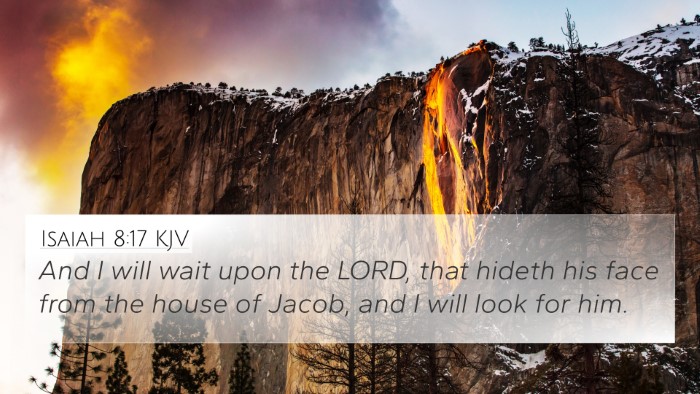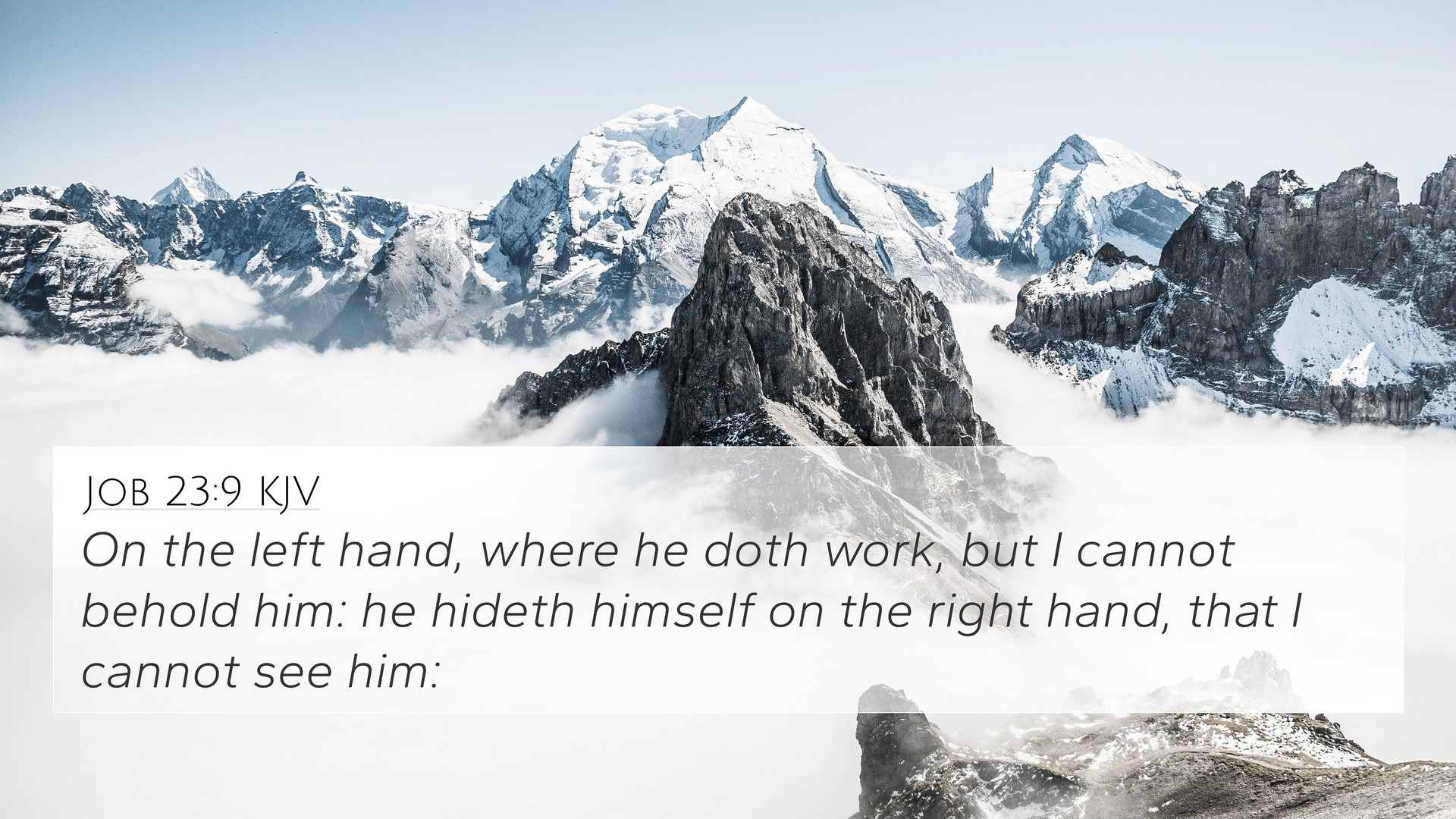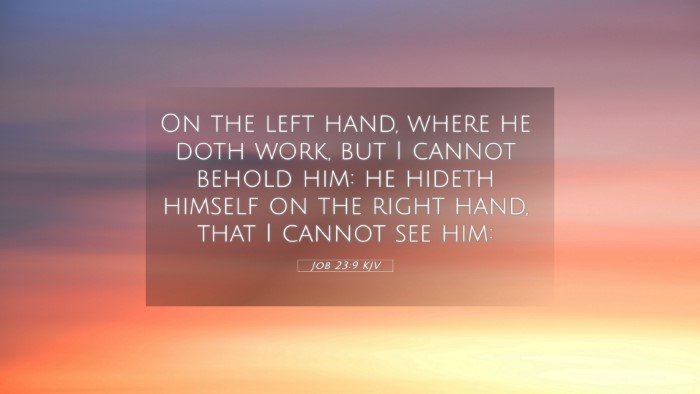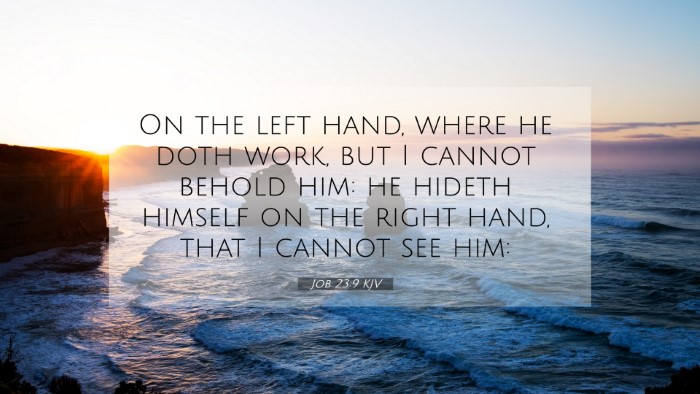Old Testament
Genesis Exodus Leviticus Numbers Deuteronomy Joshua Judges Ruth 1 Samuel 2 Samuel 1 Kings 2 Kings 1 Chronicles 2 Chronicles Ezra Nehemiah Esther Job Psalms Proverbs Ecclesiastes Song of Solomon Isaiah Jeremiah Lamentations Ezekiel Daniel Hosea Joel Amos Obadiah Jonah Micah Nahum Habakkuk Zephaniah Haggai Zechariah MalachiJob 23:9 Similar Verses
Job 23:9 Cross References
On the left hand, where he doth work, but I cannot behold him: he hideth himself on the right hand, that I cannot see him:
Uncover the Rich Themes and Topics of This Bible Verse
Listed below are the Bible themes associated with Job 23:9. We invite you to explore each theme to gain deeper insights into the Scriptures.
Job 23:9 Cross Reference Verses
This section features a detailed cross-reference designed to enrich your understanding of the Scriptures. Below, you will find carefully selected verses that echo the themes and teachings related to Job 23:9 KJV. Click on any image to explore detailed analyses of related Bible verses and uncover deeper theological insights.

Psalms 89:46 (KJV) »
How long, LORD? wilt thou hide thyself for ever? shall thy wrath burn like fire?

Isaiah 8:17 (KJV) »
And I will wait upon the LORD, that hideth his face from the house of Jacob, and I will look for him.
Job 23:9 Verse Analysis and Similar Verses
Understanding Job 23:9
Job 23:9 states, "On the left hand where he doeth work, but I cannot behold him: he hideth himself on the right hand, that I cannot see him." This verse illustrates Job's deep longing to encounter God amid his suffering and confusion. Despite his trials, Job acknowledges God's presence and action, even when he cannot perceive them.
Insights from Public Domain Commentaries
- Matthew Henry: Job expresses his feeling of distance from God, who works in mysterious ways. Henry emphasizes that while Job cannot see God's hand at work, he still believes in God's sovereignty over his circumstances.
- Albert Barnes: Barnes highlights the concept of God's hidden work. He signifies that God's presence may not always be visible to us, yet His actions are continuously guiding and determining our lives.
- Adam Clarke: Clarke discusses the contrast between perceiving God's actions and experiencing His silence. He notes that this struggle reflects a larger human experience of seeking divine guidance and understanding, especially during times of distress.
Thematic Connections
This verse invites contemplation on the broader themes of divine presence, suffering, and God’s hidden work in the world. Notably, it suggests that there are deeper connections between human experience and divine oversight, which can be explored through cross-referencing related scriptures.
Cross-References for Job 23:9
- Psalms 139:7-10: “Whither shall I go from thy spirit?… if I take the wings of the morning, and dwell in the uttermost parts of the sea; even there shall thy hand lead me, and thy right hand shall hold me.” This passage reinforces God's omnipresence.
- Ecclesiastes 3:11: “He hath made every thing beautiful in his time…” This reflects the idea that while we may not understand God's timing or methods, He is at work for a purpose.
- Isaiah 45:15: “Verily thou art a God that hidest thyself, O God of Israel, the Saviour.” This verse parallels Job's sentiment, affirming that God indeed can be hidden yet remains sovereign.
- Romans 11:33: “O the depth of the riches both of the wisdom and knowledge of God! How unsearchable are his judgments, and his ways past finding out!” This acknowledges the complexity of God's ways.
- Hebrews 11:1: “Now faith is the substance of things hoped for, the evidence of things not seen.” This stresses the importance of faith in recognizing God's work, even in absence.
- Psalm 10:1: “Why standest thou afar off, O Lord? Why hidest thou thyself in times of trouble?” This echoes Job's feelings and questions about God's seeming absence during suffering.
- John 16:33: “In the world ye shall have tribulation: but be of good cheer; I have overcome the world.” This connects the theme of overcoming challenges with divine support.
- 2 Corinthians 5:7: “For we walk by faith, not by sight.” This encourages believers to trust in God's work beyond what is outwardly visible.
- Psalm 77:19: “Thy way is in the sea, and thy path in the great waters, and thy footsteps are not known.” This reinforces the idea of God's hidden work being effective even when undetectable by human sight.
- 1 Peter 5:7: “Casting all your care upon him; for he careth for you.” This connection offers reassurance of God's attentive presence despite our inability to perceive Him.
Exploring Job 23:9 Through Cross-Referencing
The act of cross-referencing Biblical texts serves as a profound tool for understanding scripture. By examining passages that relate to Job 23:9, readers can uncover the seamless dialogue throughout the Bible regarding faith in unseen actions. The thematic Bible verse connections reveal a cohesive narrative about divine hiddenness and presence in human affairs.
Benefits of Cross-Referencing
- Enhances understanding of scriptural themes.
- Establishes context by comparing similar experiences and teachings.
- Facilitates deeper personal study and reflection.
- Reveals insights into the nature of God and our relationship with Him.
- Enables comparative Bible verse analysis leading to a richer faith experience.
Conclusion
Job 23:9 serves as a poignant reflection on the human experience of divine silence amidst suffering. By utilizing tools for Bible cross-referencing, believers can find courage and solace through the connections between Bible verses, as illustrated in Job’s struggle. Through his story, we are encouraged to trust in God's presence and timing, even when we cannot see His hand at work.


